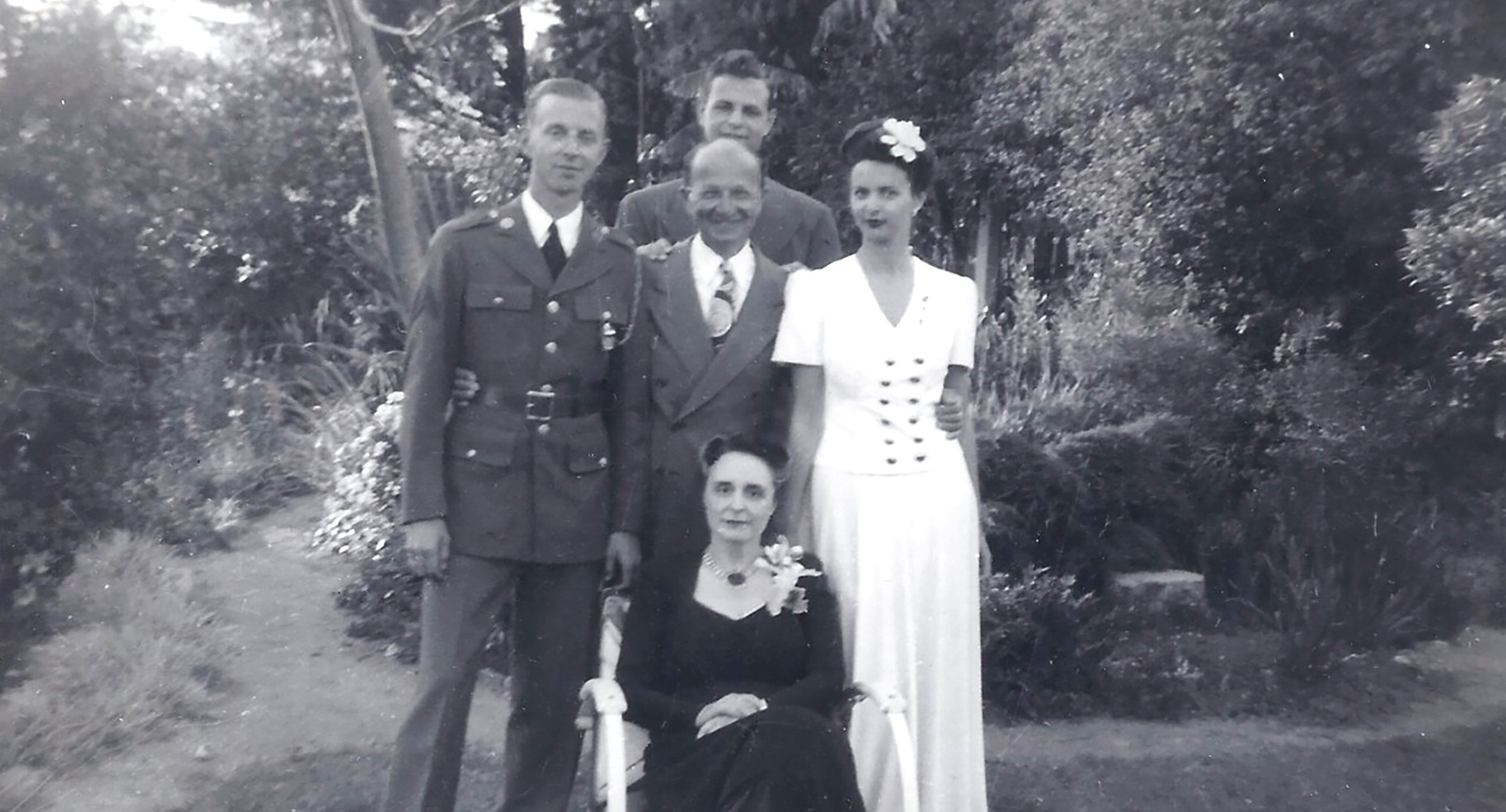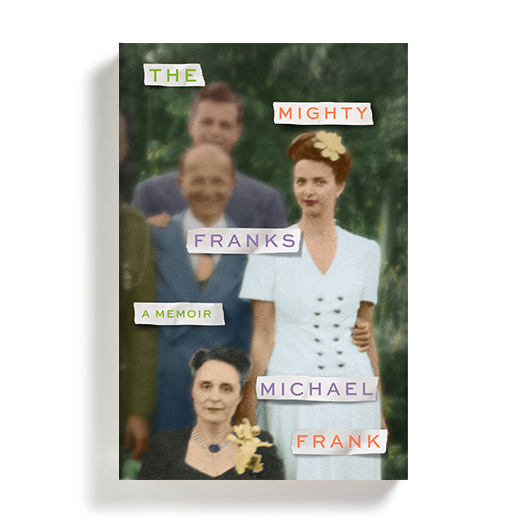The Mighty Franks is the story of one family—brilliant, close, complicated—and of one woman and the power she exerted within it. Michael Frank’s Aunt Hankie was a legendary screenwriter, and a magnetic, enthralling personality, who separated Michael from his parents and siblings and tried to make him her own. The story captures that relationship and the dramatic turns it took as Michael grew older. Here, Michael sits down with his editor, Ileene Smith, to discuss his family, Hollywood, and the connection between physical objects and memory.
Ileene Smith: I first read The Mighty Franks in a crowded car on the way back from Vermont. By the time we crossed the state line into New York, I knew I would tell my colleagues that it was the best thing I’d read about a family since The Corrections. Of course, Jonathan Franzen’s book is fiction while yours is memoir. How did you manage to write such an open book about the wild constraints of family life when the family under consideration is your own?
Michael Frank: I have been waiting for much of my conscious life to make sense of this story and to shape it, try to shape it, into a book. But first, disappointment, anger, and mystification—all those fun things!—had to evolve into something closer to understanding. This took time. A lot of time. Also trial and error—a lot of trial and error. Enough life had to accrue for me to be able to stand at an angle and capture, rather than be overrun by, these big personalities and over-the-top behaviors.
IS: While I think of The Mighty Franks as a literary memoir—Jean Strouse calls it “a work of art”—early readers have been reminded of everything from Grey Gardens and Sunset Boulevard to The Royal Tenenbaums. Do any of those comparisons compute for you?
MF: Unpredictable, unruly, self-dramatizing, heartbreaking characters in hermetic, interwoven families (though Norma Desmond and Joe Gillis as a family may be a bit of a stretch). Why not!
IS: “Interwoven.” Good word for a family that fits together like a Rubik’s cube.
MF: Or a straightjacket. . . For starters, my father’s older sister was married to my mother’s older brother. That is: brother and sister married sister and brother. My aunt and uncle had no children. They lived two blocks away from us in Laurel Canyon, California, and were very—you might say unreasonably—involved in our lives. Even my grandmothers, the mothers of these pairs of siblings, shared an apartment together for twelve years, though they disliked each other.
IS: Sounds a bit like Faulkner’s Snopes family.
MF: It’s funny you say that. My aunt used to liken her uncle Mark to Flem Snopes. He and his wife, who were childless, tried to buy my father from my grandparents—in 1926, for $100,000! This was one of the many echoes in the more distant past that intrigued me as a child and haunted me later on.
My aunt used to liken her uncle Mark to Flem Snopes. He and his wife, who were childless, tried to buy my father from my grandparents—in 1926, for $100,000!
IS: At the center of it all was your brilliant and accomplished screenwriting Aunt Hankie, Harriet Frank, Jr., whom Judith Thurman calls “one of the great difficult women in contemporary literature.” She is both the family’s center of gravity and its rogue comet.
MF: As the portrait of my aunt accrued on the page, I began to notice, almost by accident, that there were similarities to some of those especially vivid women who can be hard to take your eyes off of. Many of them we first come to know on stage—Mary Tyrone, Edward Albee’s Martha, most recently Violet in Tracy Letts’s August: Osage County, which I had to watch with my hand half-shielding my eyes. In plays, in novels, in memoirs, and especially in families it just so often happens that one person, woman or man, comes to take up more air space than anyone else.
IS: “Just happens?”
MF: I think families mold themselves to accommodate the shape of their more unwieldy members. The next thing you know, a tyrant is in office and she, or he, cannot be voted out . . .
IS: Sounds alarmingly familiar. . . Given your aunt’s and uncle’s high-wire screenwriting careers, how did Hollywood influence family life? Was there a touch of Nathanael West or The Last Tycoon?
MF: When you come of age against a certain milieu, you don’t necessarily see it as all that enchanted and nor, necessarily, do the people who inhabit it. In my family there was a kind of reverse snobbery about Hollywood. My grandmother, who worked at MGM in the forties and fifties as a story editor to the head of the studio, Louis B. Mayer, kept a diary in which she once wrote, “Someday perhaps my grandchildren will say, ‘Grandma had such a unique & glamorous job!’ to which I reply, dead or alive, ‘Oh —.’” The expletive is assumed and, knowing her, it wasn’t a low-voltage one either. My aunt and uncle were similarly dismissive of “the business.” All these people aimed their sights high—on theater, art, literature above all. They flourished in Hollywood but as old-school intellectuals they had other ambitions, originally for themselves, later for everyone who followed them.

Image courtesy of Michael Frank

Image courtesy of Michael Frank
IS: I remember you showing me a relic from your aunt’s collection of objects that she had given you years ago. It was the surviving lid of an eighteenth-century Delft jar that shattered in the 1994 Northridge earthquake. You could tell stories about that jar that in a way brings to mind Edmund de Waal’s family’s netsuke in The Hare with Amber Eyes. What else did the maison, as it is known in your book and in life, contain?
MF: What didn’t it contain? I’ve actually begun a parallel project on Instagram around objects connected to the book—it’s a kind of continuation of the story, in images and spare text. I’ve been digging into the mysteries of that house, and the lives that unfolded there, since I was a child. The Mighty Franks is my field report, my cabinet of curiosities, and it displays a good deal of what I’ve unearthed—so far.
Michael Frank’s short stories and essays have been widely anthologized. His fiction has been presented at Symphony Space. He lives with his family in New York City and Liguria, Italy. The Mighty Franks is his first book.
Ileene Smith is vice president and executive editor at Farrar, Straus and Giroux.
YOU MAY ALSO LIKE:
An Excerpt from Édouard Louis’s The End of Eddy
Heather Cass White on Editing Marianne Moore
An Interview with Jonathan Lloyd-Davies, translator of Six Four

